Wyking Surname Ancestry ResultsOur indexes 1000-1999 include entries for the spelling 'wyking'. In the period you have requested, we have the following 7 records (displaying 1 to 7): Buy all | | | Get all 7 records to view, to save and print for £30.00 |
These sample scans are from the original record. You will get scans of the full pages or articles where the surname you searched for has been found. Your web browser may prevent the sample windows from opening; in this case please change your browser settings to allow pop-up windows from this site. Broughton Court Roll
(1258)
Among the possessions of Ramsey abbey was the manor or hono(u)r of Broughton in Huntingdonshire. Among the Augmentation Office Court Rolls in the Public Record Office, a strip of three membranes (Portf. 5, No. 44) records the business of the manor court from 29 January to 30 July 1258. This was transcribed by F. W. Maitland, extending the Latin but retaining the spelling of the proper names, and printed with a facing English translation in 1889. In many cases the surnames were also Englished, e. g. Eyre for Heres, but we have reindexed the text on the original forms alone.WYKING. Cost: £4.00.  | Sample scan, click to enlarge
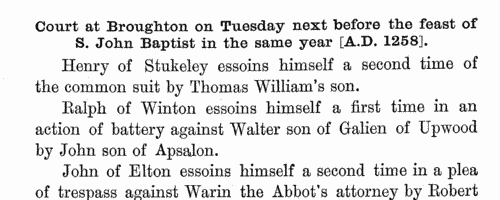
| Courtroll of the manor of Bledlow, Buckinghamshire
(1275)
King's College, Cambridge, has a series of courtrolls relating to the English possessions of the Norman abbey of Bec. C 6, a single membrane, contains the records of manorial courts from October 1275 to June 1276. F. W. Maitland selected pleas from this roll, transcribed them into extended Latin, with an English translation facing, and they were published in 1889 by the Selden Society. Maitland's translation anglicizes or modernizes the surnames, so we have confined our index to the Latin; but that is not without its difficulties, because the 13th-century clerk often latinizes what would have been indigenous English surnames (such as 'de Cimiterio' for Churchyard). This court was held 14 October 1275.WYKING. Cost: £4.00.  | Sample scan, click to enlarge
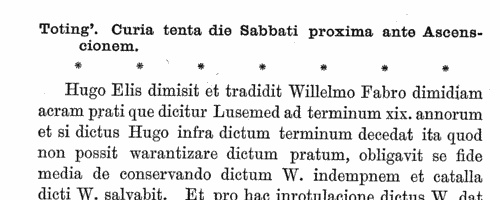
| Courtroll of the manor of Bledlow, Buckinghamshire
(1276)
King's College, Cambridge, has a series of courtrolls relating to the English possessions of the Norman abbey of Bec. C 6, a single membrane, contains the records of manorial courts from October 1275 to June 1276. F. W. Maitland selected pleas from this roll, transcribed them into extended Latin, with an English translation facing, and they were published in 1889 by the Selden Society. Maitland's translation anglicizes or modernizes the surnames, so we have confined our index to the Latin; but that is not without its difficulties, because the 13th-century clerk often latinizes what would have been indigenous English surnames (such as 'de Cimiterio' for Churchyard). This court was held 1 May 1276.WYKING. Cost: £4.00.  | Sample scan, click to enlarge
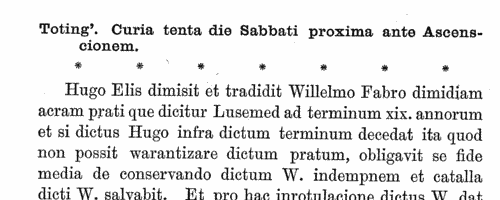
| Courtroll of the manor of Bledlow, Buckinghamshire
(1281)
King's College, Cambridge, has a series of courtrolls relating to the English possessions of the Norman abbey of Bec. C 8, a single membrane, contains the records of manorial courts from November 1280 to May 1281. F. W. Maitland selected pleas from this roll, transcribed them into extended Latin, with an English translation facing, and they were published in 1889 by the Selden Society. Maitland's translation anglicizes or modernizes the surnames, so we have confined our index to the Latin; but that is not without its difficulties, because the 13th-century clerk often latinizes what would have been indigenous English surnames (such as 'de Cimiterio' for Churchyard). This court was held 14 April 1281.WYKING. Cost: £4.00.  | Sample scan, click to enlarge
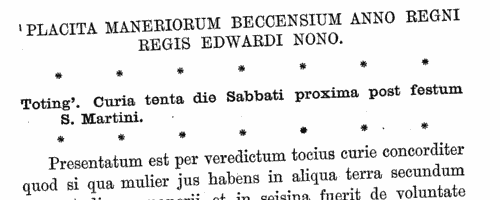
| Indults for Portable Altars: Oxford
(1404-1415)
Individuals (laymen, monks or priests) could obtain indults or indulgences from the Pope to possess portable altars, enabling them to do their devotions in unconsecrated places. The fee was 10 groats for one person, 12 for two (frequently a husband and wife). Lists of these indults, headed De Altaris Portatilibus, were entered in the Lateran Regesta in the Vatican archives; from the reigns of popes Innocent VII to John XXIII (1404 to 1415) there are such lists in volumes CXIX, CXXXI, CLIX to CLXI, CLXV, CLXVII and CLXXXIV, from the first year of Innocent VII, the second year of Gregory XII, and the second to fifth years of John XXIII. Those relating to the British Isles were copied and translated by J. A. Twemlow, and printed under the direction of the Master of the Rolls in 1904. WYKING. Cost: £4.00.  | Sample scan, click to enlarge
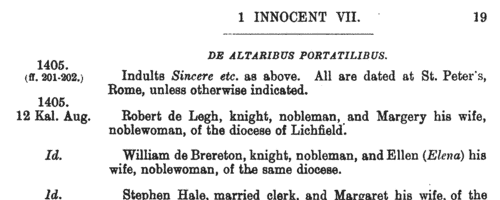
| The English in France
(1414-1415)
King Henry V of England claimed the throne of France (and quartered the fleurs-de-lis of France with the lions of England on the royal standard) as had his predecessors since Edward III, as descendants of Philip IV of France. He married Katherine, youngest daughter of king Charles VI of France in 1420, and thereafter styled himself 'heir and regent of France'. The English had real power or influence in Brittany, Normandy, Flanders and Gascony, and actual possession of several coastal garrisons, in particular Calais, where the French inhabitants had been replaced by English. The English administration kept a series of records called the French Rolls. On these are recorded royal appointments and commissions in France; letters of protection and safe-conduct to soldiers, merchants, diplomats and pilgrims travelling to France from England and returning, and to foreign legations. There are also licences to merchants to export to the Continent, and to captains to transport pilgrims. This calendar of the French Roll for the 2nd year of the reign of Henry V (21 March 1414 to 20 March 1415) was prepared by Alexander Charles Ewald and published in 1883.WYKING. Cost: £6.00.  | Sample scan, click to enlarge
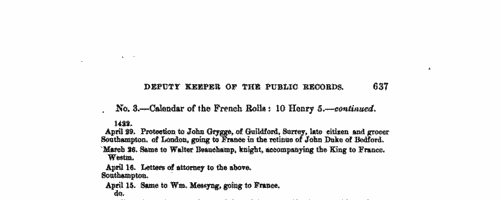
| Clerks, clergy, benefactors and tenants of the Hospital of St Nicholas, Salisbury
(1214-1439)
Christopher Wordsworth, Master of the Hospital of St Nicholas in Salisbury, Wiltshire, published an edition of the 15th-century cartulary of that foundation in 1902. While transcribing the text, he interspersed it with notes and lists from his own researches so as to provide a general history of the hospital, and some of the material dates from much later than 1500, and relates to those institutions which he regarded as daughter institutions or offshoots of the hospital. There are later additions to the cartulary through to 1639, and records of the Chapel of St John Baptist on the Isle, the Scotist College of St Nicholas de Vaux (Valle Scholarium), and the collegiate church of St Edmund, Salisbury. There is also a calendar of records belonging to the hospital. The cartulary itself is a quarto codex of 80 leaves, copying charters of bequests to the hospital, and in these the main persons to appear are the benefactors, the witnesses, and occasionally the names of tenants, occupiers of adjoining tenements, and members of the hospital clergy. The cartulary is in six geographical sections: I, Box, Wyvelesford and Manningford Bohun; II, Broad Hinton; III, Fyssherton (Fisherton Aucher or Anger); IV, East and West Harnham; V, Salisbury; and VI, Gerardeston (Gurston in Broadchalke).WYKING. Cost: £4.00.  | Sample scan, click to enlarge
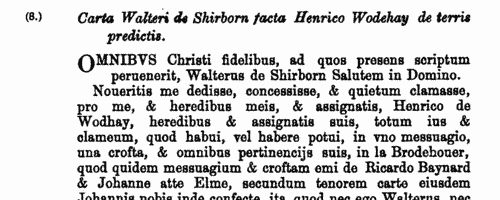
|
Research your ancestry, family history, genealogy and one-name study by direct access to original records and archives indexed by surname.
|









